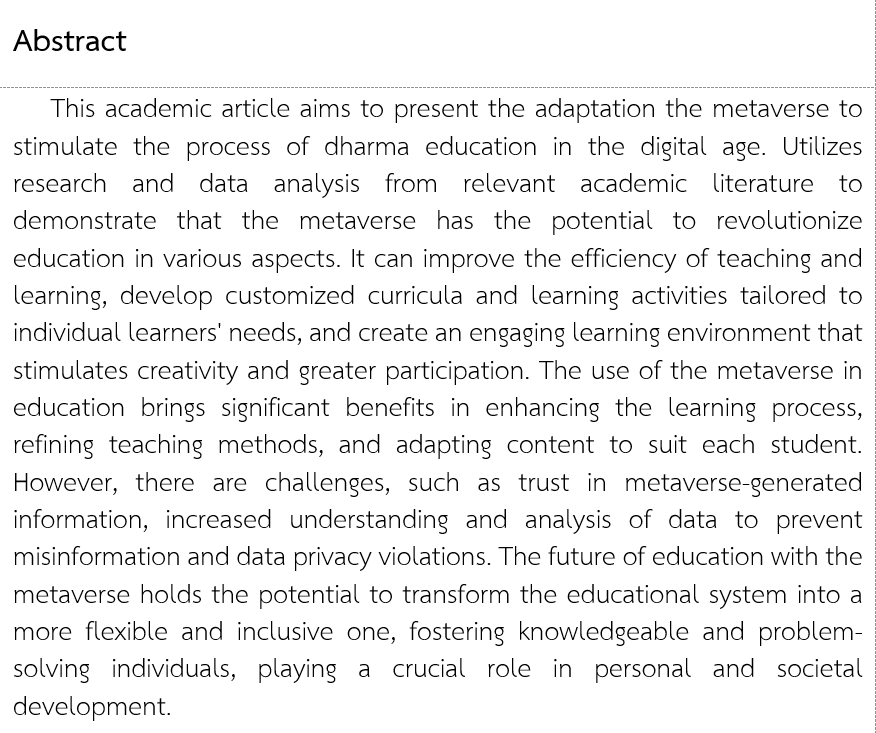Adapting the Metaverse to Stimulate the Process of Dharma Education in the Digital Age
DOI:
https://doi.org/10.14456/jcct.2023.14Keywords:
Metaverse, Learning Process, Dhamma Education, Teaching InnovationAbstract
This academic article aims to present the adaptation the metaverse to stimulate the process of dharma education in the digital age. Utilizes research and data analysis from relevant academic literature to demonstrate that the metaverse has the potential to revolutionize education in various aspects. It can improve the efficiency of teaching and learning, develop customized curricula and learning activities tailored to individual learners' needs, and create an engaging learning environment that stimulates creativity and greater participation. The use of the metaverse in education brings significant benefits in enhancing the learning process, refining teaching methods, and adapting content to suit each student. However, there are challenges, such as trust in metaverse-generated information, increased understanding and analysis of data to prevent misinformation and data privacy violations. The future of education with the metaverse holds the potential to transform the educational system into a more flexible and inclusive one, fostering knowledgeable and problem-solving individuals, playing a crucial role in personal and societal development.
Downloads
References
1. กรกช ขันธบุญ. รูปแบบการสื่อสารผ่านเม ตาเวิร์สเพื่อการเรียนการสอนสาขาวิชานิเทศศาสตร์ มหาวิทยาลัยสุโขทัยธรรมาธิราช. มนุษยสังคมสาร (มสส.). 2565;20(3):123-144.
2. Skywell Software. The Impact of the Metaverse on Education. [Internet]. [Retrieved February 21st, 2023]. Available from: https://skywell.software/blog/impact-of-metaverse-on-education.
3. องค์การพิพิธภัณฑ์วิทยาศาสตร์แห่งชาติ. AR กับ VR คืออะไร...แล้วต่างกันอย่างไร. [อินเทอร์เน็ต]. [สืบค้นเมื่อ 4 ตุลาคม 2566]. สืบค้นจาก: https://www.nsm.or.th/nsm/th/node/4327.
4. Earnshaw R. Research and Development in Digital Media. Springer. 2018.
5. Dewdney A and Ride P. The Digital Media Handbook. Routledge. 2013.
6. สุชาติ เพชรเทียนชัย, ศุภวรรณ วงศ์สร้างทรัพย์, ธีรศักดิ์ สร้อยคีรี. ปัญญาประดิษฐ์ในพลศึกษาเพื่อการเรียนรู้. วารสารศาสตร์การศึกษาและการพัฒนามนุษย์. 2565;6(2):47-60.
7. Stephenson N. Snow Crash: A Novel. Spectra. 2003.
8. ธนภัทร ศรีผ่าน และ ภัทรวรรธน์ จีรพัฒธนธร. อนวัตกรรม: การพัฒนาขั้นสุดท้ายของนวัตกรรมและบทบาทของเมตาเวิร์สเพื่อการศึกษาและการฝึกอบรมในยุคเน็กซ์นอร์มอล. วารสารนวัตกรรมและการจัดการ. 2565;7(2):174-188.
9. Lin H, Wan S, Gan W, Chen J, Chao HC. Metaverse in Education: Vision, Opportunities, and Challenges. Japan, Osaka: Proceeding of IEEE International Conference on Big Data (Big Data); 2022. 2857-2866. doi: 10.1109/BigData55660.2022.10021004.
10. Hackl C, Lueth D, Di Bartolo T. Navigating the Metaverse: A Guide to Limitless Possibilities in a Web 3.0 World. John Wiley & Sons. 2022.
11. พระมหาสมชาย ขนฺติสรโณ. การประยุกต์ใช้เมตาเวิร์สเพื่อการส่งเสริมการเรียนรู้พระพุทธศาสนาเสมือนจริงในยุคดิจิทัล. วารสารวิชาการรัฐศาสตร์และรัฐประศาสนศาสตร์. 2566;5(2):49-57.
12. ณัฐวดี ศิลปศักดิ์ขจร และ ธีรศักดิ์ อุ่นอารมย์เลิศ. การศึกษาสภาพการใช้ปัญหาและอุปสรรคในการใช้เทคโนโลยีสารสนเทศเพื่อการศึกษาภายในโรงเรียนสังกัดเขตพื้นที่การศึกษาประถมศึกษาจังหวัดนครปฐม. วารสาร Veridian E Journal สาขามนุษยศาสตร์ สังคมศาสตร์ และศิลปะ. 2558;8(2):628-638.
13. Tari E. Metaverse Challenges and Opportunities in the Gospel Message. Riwayat: Educational Journal of History and Humanities. 2023;6(2):510-518.
14. Alfaisal R, Hashim H, Azizan UH. Metaverse System Adoption in Education: a Systematic Literature Review. Journal of Computers in Education. 2022;12:1-45. doi:10.1007/s40692-022-00256-6.

Downloads
Published
How to Cite
Issue
Section
Categories
License
Copyright (c) 2023 Journal of Computer and Creative Technology

This work is licensed under a Creative Commons Attribution-NonCommercial-NoDerivatives 4.0 International License.






























